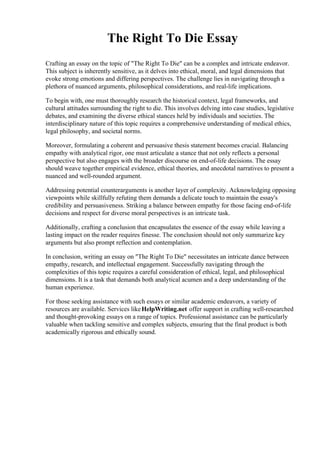The Vegan Stance On Halal Slaughter: Arguments And Counterarguments

Table of Contents
Vegan Arguments Against Halal Slaughter
The vegan perspective on halal slaughter stems from a fundamental opposition to the exploitation and harm of animals. Several key arguments underpin this stance.
The Infliction of Pain and Suffering
Even when adhering to halal guidelines, which mandate a swift and clean cut to the jugular vein, the inherent nature of slaughter involves the infliction of pain and suffering. While proponents claim that the animal experiences minimal suffering due to the quick severing of major blood vessels, studies questioning the efficacy of stunning methods employed before slaughter exist. The very act of restraining and handling an animal before slaughter inevitably induces stress and fear. This fear response itself causes significant physiological distress.
- Animal Welfare: The absence of complete insensibility during halal slaughter raises serious concerns regarding animal welfare standards.
- Ethical Slaughter: The debate centers around what constitutes "ethical slaughter," with vegans arguing that no method of killing a sentient being can be truly ethical.
- Suffering: The potential for pain and suffering, even if short-lived, is a major point of contention for those who advocate for vegan ethics.
- Halal Practices: While halal guidelines aim to minimize suffering, the subjective nature of evaluating pain and the variability in practice across different abattoirs remain significant concerns.
The Contradiction with Vegan Principles
At its core, veganism is a philosophy and way of life that seeks to exclude, as far as is possible and practicable, all forms of exploitation of, and cruelty to, animals. The act of killing any animal, regardless of the method, directly contradicts this core tenet.
- Vegan Philosophy: The fundamental principle of veganism is the avoidance of animal exploitation and cruelty in all its forms.
- Animal Exploitation: Halal slaughter, even if considered humane, still constitutes the exploitation of animals for human consumption.
- Animal Rights: From an animal rights perspective, the killing of an animal, irrespective of the method, is considered a violation of their right to life.
- Ethical Consumption: Vegans advocate for a cruelty-free lifestyle, rejecting any participation in the commodification and killing of animals.
Environmental Concerns Related to Meat Consumption
Beyond the ethical considerations, the environmental impact of animal agriculture, including the production of halal meat, significantly contributes to the vegan argument. The intensive farming practices associated with meat production lead to:
- Climate Change: Animal agriculture is a major contributor to greenhouse gas emissions, contributing significantly to climate change.
- Land Use: Vast tracts of land are required for animal grazing and feed production, impacting biodiversity and natural ecosystems.
- Water Consumption: Meat production consumes enormous amounts of water, placing pressure on already strained water resources.
- Sustainable Living: Vegans advocate for a lifestyle that minimizes environmental impact and promotes sustainable living practices.
Counterarguments and Nuances
While the vegan arguments against halal slaughter are strong, it's crucial to acknowledge counterarguments and nuances within the debate.
Religious Freedom and Cultural Significance
Halal dietary laws are central to Islamic faith and culture for many millions of people. Therefore, any discussion about halal slaughter must demonstrate respect for religious freedom and cultural practices.
- Religious Freedom: Restricting or criticizing halal practices could be seen as an infringement on religious freedom.
- Cultural Sensitivity: It’s crucial to approach this discussion with cultural sensitivity, avoiding language that is dismissive or disrespectful of religious beliefs.
- Halal Dietary Laws: Understanding the religious significance of halal food for many communities is paramount to a productive dialogue.
- Cultural Heritage: Halal practices are deeply intertwined with the cultural heritage of many communities, and this cultural significance must be respected.
Humane Slaughter Techniques and Certification
While the potential for pain and suffering remains a concern, advancements in humane slaughter techniques and certification processes offer a pathway towards minimizing animal suffering even within the context of halal slaughter.
- Humane Slaughter: Improved stunning methods and swift slaughter practices can reduce the overall suffering experienced by animals.
- Animal Welfare Standards: Certification bodies play a vital role in setting and enforcing animal welfare standards in abattoirs.
- Halal Certification: Seeking halal certification from reputable organizations can help ensure adherence to guidelines promoting humane slaughter.
- Ethical Sourcing: Consumers can actively support ethical sourcing by choosing halal meat from suppliers committed to humane slaughter practices.
The Question of Intent and Belief
Some argue that the intention and belief behind the act of slaughter hold spiritual significance and influence the outcome. This perspective highlights the differences in perspectives on what constitutes "humane" versus "cruel."
- Religious Belief: The spiritual aspect of halal slaughter is a key factor for many Muslims, influencing their perception of the process.
- Spiritual Considerations: For many adherents, the act is performed with prayer and respect, intending to minimize suffering.
- Compassionate Consumption: While this perspective doesn't negate the inherent suffering of slaughter, it does introduce a spiritual dimension often overlooked in the debate.
- Ethical Dilemmas: This highlights the complex ethical dilemmas inherent in reconciling religious beliefs and animal welfare concerns.
Conclusion: A Vegan Perspective on Halal Slaughter
The vegan stance on halal slaughter rests on the fundamental principles of avoiding animal exploitation and minimizing animal suffering. While acknowledging the importance of religious freedom and cultural sensitivity, the inherent contradictions between halal practices and core vegan values remain a significant point of contention. The discussion surrounding improved slaughterhouse practices and certifications offers some potential for mitigation, but the ethical questions raised by the killing of sentient beings are complex and require ongoing dialogue and critical consideration.
We encourage further research into the issue of halal slaughter and veganism. Engaging in thoughtful discussions, exploring alternative protein sources, and making informed choices aligned with your values are vital steps. Share your thoughts and perspectives in the comments below – let's continue this crucial conversation. Learn more from organizations dedicated to animal welfare and ethical consumption. [Link to relevant organization 1] [Link to relevant organization 2]

Featured Posts
-
 New Live Studio For Kelly Ripa And Mark Consuelos A Look At Fan Feedback
May 13, 2025
New Live Studio For Kelly Ripa And Mark Consuelos A Look At Fan Feedback
May 13, 2025 -
 Jay Idzes Main Penuh Venezia Imbangi Atalanta Kabar Baik Timnas Indonesia
May 13, 2025
Jay Idzes Main Penuh Venezia Imbangi Atalanta Kabar Baik Timnas Indonesia
May 13, 2025 -
 Ostapenko Defeats Swiatek For Second Time Secures Stuttgart Semifinal Spot
May 13, 2025
Ostapenko Defeats Swiatek For Second Time Secures Stuttgart Semifinal Spot
May 13, 2025 -
 Zelenskys Plea Trumps Role In Ukraine Peace Talks
May 13, 2025
Zelenskys Plea Trumps Role In Ukraine Peace Talks
May 13, 2025 -
 Dapatkan Rm 800 Kredit Cas Dengan Tempahan Byd Ev Di Mas 2025 9 15 Mei Nikmati Konsert
May 13, 2025
Dapatkan Rm 800 Kredit Cas Dengan Tempahan Byd Ev Di Mas 2025 9 15 Mei Nikmati Konsert
May 13, 2025
